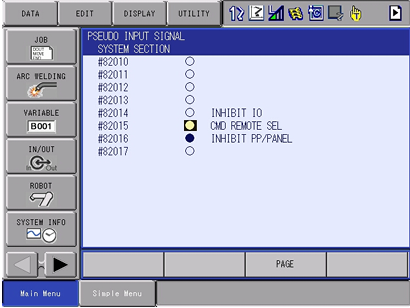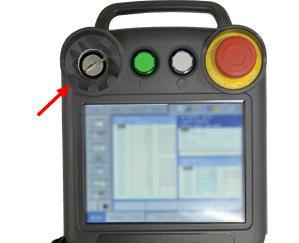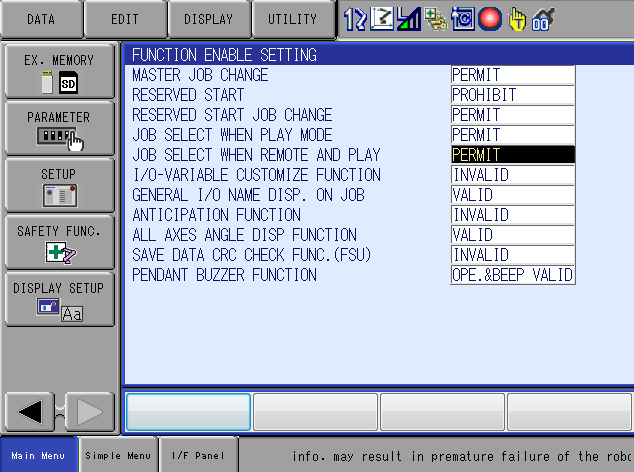UnderAutomation.Yaskawa
1.0.0
See the version list below for details.
dotnet add package UnderAutomation.Yaskawa --version 1.0.0
NuGet\Install-Package UnderAutomation.Yaskawa -Version 1.0.0
<PackageReference Include="UnderAutomation.Yaskawa" Version="1.0.0" />
<PackageVersion Include="UnderAutomation.Yaskawa" Version="1.0.0" />
<PackageReference Include="UnderAutomation.Yaskawa" />
paket add UnderAutomation.Yaskawa --version 1.0.0
#r "nuget: UnderAutomation.Yaskawa, 1.0.0"
#:package UnderAutomation.Yaskawa@1.0.0
#addin nuget:?package=UnderAutomation.Yaskawa&version=1.0.0
#tool nuget:?package=UnderAutomation.Yaskawa&version=1.0.0
Yaskawa Communication SDK
🤖 Effortlessly Communicate with Yaskawa robots
The Yaskawa SDK enables seamless integration with Yaskawa robots for automation, data exchange, and remote control. Ideal for industrial automation, research, and advanced robotics applications.
🔗 More Information: https://underautomation.com/yaskawa
🔗 Also available for 🟨 LabVIEW & 🐍 Python
👁️ Watch to be notified of latest updates !
🚀 TL;DR (Too Long; Didn’t Read)
A powerful and efficient .NET library for communicating with Yaskawa Motoman industrial robots using the High-Speed Ethernet Server (HSES) protocol. Enables seamless connectivity, motion control, and data acquisition.
✅ No additional installations or Yaskawa options are required to use this SDK.
Key Benefits:
- 📡 Fast & Reliable: Leverage high-speed UDP communication for real-time control.
- 🛠️ Easy Integration: Works with .NET projects, compatible with VB.NET and C#.
- 🤖 Advanced Features: Supports status monitoring, alarm handling, job selection, and more.
- 🌎 Cross-Platform: Works with Windows/Linux using .NET Core.
📥 Download Example Applications
Explore the Yaskawa SDK with fully functional example applications and precompiled binaries for various platforms. See Github releases
🔹 Windows Forms Application (Full Feature Showcase)
A Windows Forms application demonstrating all the features of the library.
📌 Download: 📥 UnderAutomation.Yaskawa.Showcase.Forms.exe
Features ✨
Connect to the Robot
// Connect to the robot
var robot = new YaskawaRobot();
robot.Connect("192.168.0.1");
// Ensure robot is connected
bool isConnected = robot.HighSpeedEServer.Connected;
Move robot
To move the robot, your robot must be correctly configured, see the section below.
Move Cartesian
robot.HighSpeedEServer.MoveCartesian(
x: 1000,
y: 10,
z: 0,
rx: 0,
ry: 0,
rz: 0,
PositionCommandClassification.Cartesian_MM_S,
speed:10,
PositionCommandOperationCoordinate.Robot
);
| Argument name | Argument type | Optional | Description |
|---|---|---|---|
| x | Double | X coordinate in millimeter | |
| y | Double | Y coordinate in millimeter | |
| z | Double | Z coordinate in millimeter | |
| rx | Double | Rx coordinate in degrees | |
| ry | Double | Ry coordinate in degrees | |
| rz | Double | Rz coordinate in degrees | |
| classification | PositionCommandClassification | Unit for speed (LinkPercent, Cartesian_MM_S, Cartesian_DEG_S) |
|
| speed | Double | Move speed | |
| coordinate | PositionCommandOperationCoordinate | Frame coordinate (Base, Robot, User, Tool) |
|
| posture | RobotPosture | ✅ | Robot target posture (RCONF) |
| commandtype | PositionCommandType | ✅ | Command type (LinkAbsolute, StraightAbsolute, StraightIncrement) |
| RobotControlGroup | Integer | ✅ | Control group (default: 1) |
| StationControlGroup | Integer | ✅ | Station control group (default: 0) |
| tool | Integer | ✅ | Selected TCP (default: 0) |
| userCoordinate | Integer | ✅ | User coordinate for User coordinate (default: 0) |
Move joint
robot.HighSpeedEServer.MoveJoints(new int[] { 1000, 0, 0, 0, 0, 0 }, PositionCommandClassification.LinkPercent, 10);
| Argument name | Argument type | Optional | Description |
|---|---|---|---|
| axesPulse | Integer[] | Axes position in degrees | |
| classification | PositionCommandClassification | Classification (LinkPercent, Cartesian_MM_S, Cartesian_DEG_S) |
|
| speed | Double | Movement speed in degrees/s | |
| commandtype | PositionCommandType | ✅ | Command type (LinkAbsolute, StraightAbsolute, StraightIncrement) (default: StraightIncrement) |
| RobotControlGroup | Integer | ✅ | Robot control group (default: 1) |
| StationControlGroup | Integer | ✅ | Station control group (default: 1) |
| tool | Integer | ✅ | Selected TCP (default: 0) |
Robot position
Get cartesian position
RobotPositionCartesianData position = robot.HighSpeedEServer.GetRobotCartesianPosition();
Properties of class RobotPositionCartesianData :
| Property | Type |
|---|---|
| Form | RobotPosture |
| DataType | RobotPositionDataType |
| ToolNumber | Integer |
| UserCoordinateNumber | Integer |
| X | Double |
| Y | Double |
| Z | Double |
| Rx | Double |
| Ry | Double |
| Rz | Double |
Get joint position, error and torque
// Get position pulses of each axes
RobotPositionData(Of Integer) position = robot.HighSpeedEServer.GetRobotJointPosition();
// Get position error of each axes in pulses
RobotPositionData(Of Integer) error = robot.HighSpeedEServer.GetPositionError();
// Get torque in mNm of each axes
RobotPositionData(Of Integer) torque = robot.HighSpeedEServer.GetTorque();
Properties of class RobotPositionData(Of Integer) :
| Property | Type |
|---|---|
| Form | RobotPosture |
| DataType | RobotPositionDataType |
| ToolNumber | Integer |
| UserCoordinateNumber | Integer |
| Axes | Integer[] |
Alarms
Reset Alarms
robot.HighSpeedEServer.AlarmReset(AlarmResetType.Reset);
Get Alarms
RobotAlarmData alarm = robot.HighSpeedEServer.GetAlarm(RobotRecentAlarm.Latest);
Members of enum RobotRecentAlarm :
| RobotRecentAlarm | Value |
|---|---|
| Latest | 1 |
| SecondLatest | 2 |
| ThirdLatest | 3 |
| FourthLatest | 4 |
Properties of class RobotAlarmData :
| Property | Type |
|---|---|
| Code | Integer |
| Data | Integer |
| Type | Integer |
| OccurringTime | String |
| Text | String |
Robot Status
RobotStatusData statusData = robot.HighSpeedEServer.GetStatusInformation();
Properties of class RobotStatusData :
| Property | Type |
|---|---|
| Step | Boolean |
| Cycle | Boolean |
| Automatic | Boolean |
| Running | Boolean |
| InGuardSafeOperation | Boolean |
| Teach | Boolean |
| Play | Boolean |
| CommandRemote | Boolean |
| InHoldStatusPendant | Boolean |
| InHoldStatusExternally | Boolean |
| InHoldStatusByCommand | Boolean |
| Alarming | Boolean |
| ErrorOccurring | Boolean |
| ServoOn | Boolean |
Servo commands
To send servo commands, your robot must be correctly configured, see the section below.
/// Servo on
robot.HighSpeedEServer.ServoCommand(OnOffCommandType.Servo, true);
/// Servo off
robot.HighSpeedEServer.ServoCommand(OnOffCommandType.Servo, false);
Members of enum OnOffCommandType :
| Name | Value |
|---|---|
| Hold | 1 |
| Servo | 2 |
| HLock | 3 |
Switching commands
robot.HighSpeedEServer.SwitchingCommand(SwitchingCommands.Cycle);
Members of enum SwitchingCommands :
| Name | Value |
|---|---|
| Cycle | 1 |
| Step | 2 |
| Continue | 3 |
Display popup message on Pendant
robot.HighSpeedEServer.Display("Hello !");
Job
Select and start job
To select and start a job, your robot must be correctly configured, see the section below.
robot.HighSpeedEServer.SelectJob("PROGRAM", line:0);
robot.HighSpeedEServer.StartJob();
```
#### Get executing job information
```csharp
RobotJobData jobInformation = robot.HighSpeedEServer.GetExecutingJobInformation();
Properties of class RobotJobData :
| Property | Type |
|---|---|
| Name | String |
| Line | Integer |
| Step | Integer |
| SpeedOverride | Integer |
Read and Write Data
Read and Write IO Signals
Description:
The ReadIO and WriteIO functions allow reading and writing robot I/O signals. These include user input signals, user output signals, external signals, network signals, and system control signals.
First index :
- 1 to 512 : Robot user input signal
- 1001 to 1512: Robot user output signal
- 2001 to 2512: External input signal
- 2701 to 2956: Network input signal
- 3001 to 3512: External output signal
- 3701 to 3956: Network output signal
- 4001 to 4160: Robot system input signal
- 5001 to 5300: Robot system output signal
- 6001 to 6064: Interface panel input signal
- 7001 to 7999: Auxiliary relay signal
- 8001 to 8128: Robot control status signal
Example: Reading IO Data
int firstIndex = 1001; // Robot user output signal
int count = 4; // Number of bytes to read
var ioData = robot.HighSpeedEServer.ReadIO(firstIndex, count);
Console.WriteLine("IO Data: " + BitConverter.ToString(ioData.Values));
Example: Writing IO Data
int firstIndex = 1001; // Robot user output signal
byte[] dataToWrite = new byte[] { 0x01, 0x00, 0xFF, 0x00 };
robot.HighSpeedEServer.WriteIO(firstIndex, dataToWrite);
Console.WriteLine("IO Data written successfully.");
Read and Write Registers
Description:
Registers store numerical data. The ReadRegister and WriteRegister methods allow interaction with these values.
Example: Reading Register Data
int firstIndex = 10; // Starting register index
int count = 2; // Number of registers to read
var registerData = robot.HighSpeedEServer.ReadRegister(firstIndex, count);
Console.WriteLine("Register Data: " + string.Join(", ", registerData.Values));
Example: Writing Register Data
int firstIndex = 10; // Starting register index
ushort[] dataToWrite = new ushort[] { 1234, 5678 };
robot.HighSpeedEServer.WriteRegister(firstIndex, dataToWrite);
Console.WriteLine("Register Data written successfully.");
Read and Write Byte Data
Description:
Reads and writes byte-type variables from the robot system.
Example: Reading Byte Data
int firstIndex = 2001; // External input signal
int count = 6; // Number of bytes to read
var byteData = robot.HighSpeedEServer.ReadByte(firstIndex, count);
Console.WriteLine("Byte Data: " + BitConverter.ToString(byteData.Values));
Example: Writing Byte Data
int firstIndex = 2001; // External input signal
byte[] dataToWrite = new byte[] { 0xAA, 0xBB, 0xCC, 0xDD };
robot.HighSpeedEServer.WriteByte(firstIndex, dataToWrite);
Console.WriteLine("Byte Data written successfully.");
Read and Write Integer Data
Description:
Reads and writes integer-type variables from the robot system.
Example: Reading Integer Data
int firstIndex = 5001; // Robot system output signal
int count = 4; // Number of integers to read
var intData = robot.HighSpeedEServer.ReadInteger(firstIndex, count);
Console.WriteLine("Integer Data: " + string.Join(", ", intData.Values));
Example: Writing Integer Data
int firstIndex = 5001; // Robot system output signal
short[] dataToWrite = new short[] { 100, -50, 200, -100 };
robot.HighSpeedEServer.WriteInteger(firstIndex, dataToWrite);
Console.WriteLine("Integer Data written successfully.");
Read and Write Double Precision Data
Description:
Reads and writes 64-bit floating-point values.
Example: Reading Double Data
int firstIndex = 6001; // Interface panel input signal
int count = 2; // Number of doubles to read
var doubleData = robot.HighSpeedEServer.ReadDouble(firstIndex, count);
Console.WriteLine("Double Data: " + string.Join(", ", doubleData.Values));
Example: Writing Double Data
int firstIndex = 6001; // Interface panel input signal
double[] dataToWrite = new double[] { 123.456, -78.90 };
robot.HighSpeedEServer.WriteDouble(firstIndex, dataToWrite);
Console.WriteLine("Double Data written successfully.");
Read and Write Single Precision Data
Description:
Reads and writes 32-bit floating-point values.
Example: Reading Single Data
int firstIndex = 7001; // Auxiliary relay signal
int count = 3; // Number of floats to read
var floatData = robot.HighSpeedEServer.ReadSingle(firstIndex, count);
Console.WriteLine("Float Data: " + string.Join(", ", floatData.Values));
Example: Writing Single Data
int firstIndex = 7001; // Auxiliary relay signal
float[] dataToWrite = new float[] { 1.23f, -4.56f, 7.89f };
robot.HighSpeedEServer.WriteSingle(firstIndex, dataToWrite);
Console.WriteLine("Float Data written successfully.");
Read and Write 16-Byte Character Data
Description:
Reads and writes string data, where each entry consists of 16 bytes.
Example: Reading 16-Byte Character Data
int firstIndex = 8001; // Robot control status signal
int count = 2; // Number of strings to read
var charData = robot.HighSpeedEServer.Read16BytesChar(firstIndex, count);
Console.WriteLine("Character Data: " + string.Join(", ", charData.Values));
Example: Writing 16-Byte Character Data
int firstIndex = 8001; // Robot control status signal
string[] dataToWrite = new string[] { "HelloRobot", "MoveFaster" };
robot.HighSpeedEServer.Write16BytesChar(firstIndex, dataToWrite);
Console.WriteLine("Character Data written successfully.");
Read and Write Position Variables
Description:
Reads and writes robot position data.
Example: Reading Position Variable
int firstIndex = 9001; // Robot position variable index
int count = 1; // Number of position variables to read
var positionData = robot.HighSpeedEServer.ReadPositionVariable(firstIndex, count);
Console.WriteLine("Position Data: " + positionData);
Example: Writing Position Variable
int firstIndex = 9001; // Robot position variable index
var position = new RobotPositionData<int> { DataType = 1, Axes = new int[] { 10, 20, 30, 40, 50, 60, 70, 80 } };
robot.HighSpeedEServer.WritePositionVariable(firstIndex, new[] { position });
Console.WriteLine("Position Data written successfully.");
Read and Write Base Position
Description:
Reads and writes base position data for robot movement.
Example: Reading Base Position
int firstIndex = 9101; // Base position index
int count = 1; // Number of base positions to read
var basePositionData = robot.HighSpeedEServer.ReadBasePosition(firstIndex, count);
Console.WriteLine("Base Position Data: " + basePositionData);
Example: Writing Base Position
int firstIndex = 9101; // Base position index
var basePosition = new RobotBasePositionData { DataType = RobotBasePositionType.Absolute, Axes = new int[] { 5, 10, 15, 20, 25, 30, 35, 40 } };
robot.HighSpeedEServer.WriteBasePosition(firstIndex, new[] { basePosition });
Console.WriteLine("Base Position Data written successfully.");
Here is the updated markdown document including the Read32BytesChar and Write32BytesChar functions.
Read and Write 32-Byte Character Data
Description:
The Read32BytesChar and Write32BytesChar functions allow reading and writing string data with a fixed size of 32 bytes per entry. Any characters beyond this limit are truncated, and shorter strings are padded with null (0x00) bytes.
Example: Reading 32-Byte Character Data in C#
int firstIndex = 8501; // Example index for reading 32-byte character data
int count = 2; // Number of string entries to read
var charData = robot.HighSpeedEServer.Read32BytesChar(firstIndex, count);
Console.WriteLine("Character Data: " + string.Join(", ", charData.Values));
Example: Writing 32-Byte Character Data in C#
int firstIndex = 8501; // Example index for writing 32-byte character data
string[] dataToWrite = new string[] { "HelloRobot32Bytes", "MoveWithPrecision" };
robot.HighSpeedEServer.Write32BytesChar(firstIndex, dataToWrite);
Console.WriteLine("32-Byte Character Data written successfully.");
File handling
Get file list
string[] files = robot.HighSpeedEServer.GetFileList("*.JBI").Files;
Upload file on robot
robot.HighSpeedEServer.LoadFile("PROGRAM.JBI", fileContent, onLoadFileProgress);
private void onLoadFileProgress(LoadFileProgress progress)
{
// Called during file loading
}
Properties of class LoadFileProgress :
| Property | Type |
|---|---|
| Completed | Boolean |
| FileName | String |
| TotalBytes | Integer |
| LoadedBytes | Integer |
Download file from robot
robot.HighSpeedEServer.GetFile("PROGRAM.JBI", onGetFileProgress);
private void onGetFileProgress(GetFileProgress progress)
{
// Called during file loading
}
Properties of class GetFileProgress :
| Property | Type |
|---|---|
| Completed | Boolean |
| FileName | String |
| DownloadedBytes | Integer |
Delete file on robot
robot.HighSpeedEServer.DeleteFile("PROGRAM.JBI");
Configure your robot
Enable remote control
- Set Management mode as Security mode
- Select
IN/OUT/PSEUDO INPUT SIGNAL - Move the cursor to the #82015
CMD REMOTE SEL, and pressINTER LOCK+SELECTto select

Authorize remote control with key
The read commands work regardless of the position of the physical key. However, if you want to send commands (Run job, Go to position, etc.), you need to put the key in the left position on Remote Control.

To enable this, we need to copy register #80011 (Key on Remote Position) to #40042 (Enable Remote Control) :
- Set Management mode as Security mode
- Select
IN/OUT/LADDER EDITOR - Ensure
#40042is not already written by a relay and add the following Rung :

Enable job select
To be able to authorise job select from the SDK, you need to set the permission :
- Set Management mode as Security mode
- Select
SETUP/FUNCTION ENABLE - Set
JOB SELECT WHEN REMOTE AND PLAYtoPERMIT. For advanced users or on the Smart Pendant, setSC2 224to0.

Authorise file overwriting
To enable the SDK to send files that already exist on the controller and overwrite them:
- Set Management mode as Security mode
- Select
PARAMETER/RS - Set
RS029to1 - Set
RS214to1
🛠 Develop your own app
1️⃣ Get the SDK
Choose the installation method that works best for you:
| Method | NuGet (Recommended) | Direct Download |
|---|---|---|
| How to Install | Install via NuGet. See on Nuget | Download and reference the DLL manually |
dotnet add package UnderAutomation.Yaskawa |
📥 Download ZIP |
2️⃣ Reference the SDK in Your Code
using UnderAutomation.Yaskawa;
3️⃣ Connect to Your Robot
var robot = new YaskawaRobot();
robot.Connect("192.168.0.1");
🔍 Compatibility
✅ Supported Robots: DX200, YRC1000, YRC1000 Micro
✅ Operating Systems: Windows, Linux, macOS
✅ .NET Versions: .NET Framework (≥3.5), .NET Standard, .NET Core, .NET 5/6/8/9
📢 Contributing
We welcome contributions! Feel free to:
- Report issues via GitHub Issues
- Submit pull requests with improvements
- Share feedback & feature requests
📜 License
⚠️ This SDK requires a commercial license.
🔗 Learn more: UnderAutomation Licensing
📬 Need Help?
If you have any questions or need support:
- 📖 Check the Docs: Documentation
- 📩 Contact Us: Support
| Product | Versions Compatible and additional computed target framework versions. |
|---|---|
| .NET | net5.0 is compatible. net5.0-windows was computed. net6.0 is compatible. net6.0-android was computed. net6.0-ios was computed. net6.0-maccatalyst was computed. net6.0-macos was computed. net6.0-tvos was computed. net6.0-windows was computed. net7.0 was computed. net7.0-android was computed. net7.0-ios was computed. net7.0-maccatalyst was computed. net7.0-macos was computed. net7.0-tvos was computed. net7.0-windows was computed. net8.0 is compatible. net8.0-android was computed. net8.0-browser was computed. net8.0-ios was computed. net8.0-maccatalyst was computed. net8.0-macos was computed. net8.0-tvos was computed. net8.0-windows was computed. net9.0 is compatible. net9.0-android was computed. net9.0-browser was computed. net9.0-ios was computed. net9.0-maccatalyst was computed. net9.0-macos was computed. net9.0-tvos was computed. net9.0-windows was computed. net10.0 was computed. net10.0-android was computed. net10.0-browser was computed. net10.0-ios was computed. net10.0-maccatalyst was computed. net10.0-macos was computed. net10.0-tvos was computed. net10.0-windows was computed. |
| .NET Core | netcoreapp2.0 was computed. netcoreapp2.1 was computed. netcoreapp2.2 was computed. netcoreapp3.0 is compatible. netcoreapp3.1 was computed. |
| .NET Standard | netstandard2.0 is compatible. netstandard2.1 is compatible. |
| .NET Framework | net35 is compatible. net40 is compatible. net403 was computed. net45 is compatible. net451 is compatible. net452 is compatible. net46 is compatible. net461 is compatible. net462 is compatible. net463 was computed. net47 is compatible. net471 is compatible. net472 is compatible. net48 is compatible. net481 was computed. |
| MonoAndroid | monoandroid was computed. |
| MonoMac | monomac was computed. |
| MonoTouch | monotouch was computed. |
| Tizen | tizen40 was computed. tizen60 was computed. |
| Xamarin.iOS | xamarinios was computed. |
| Xamarin.Mac | xamarinmac was computed. |
| Xamarin.TVOS | xamarintvos was computed. |
| Xamarin.WatchOS | xamarinwatchos was computed. |
-
.NETCoreApp 3.0
- No dependencies.
-
.NETFramework 3.5
- No dependencies.
-
.NETFramework 4.0
- No dependencies.
-
.NETFramework 4.5
- No dependencies.
-
.NETFramework 4.5.1
- No dependencies.
-
.NETFramework 4.5.2
- No dependencies.
-
.NETFramework 4.6
- No dependencies.
-
.NETFramework 4.6.1
- No dependencies.
-
.NETFramework 4.6.2
- No dependencies.
-
.NETFramework 4.7
- No dependencies.
-
.NETFramework 4.7.1
- No dependencies.
-
.NETFramework 4.7.2
- No dependencies.
-
.NETFramework 4.8
- No dependencies.
-
.NETStandard 2.0
- System.Text.Encoding.CodePages (>= 4.5.1)
-
.NETStandard 2.1
- No dependencies.
-
net5.0
- No dependencies.
-
net6.0
- No dependencies.
-
net8.0
- No dependencies.
-
net9.0
- No dependencies.
NuGet packages
This package is not used by any NuGet packages.
GitHub repositories
This package is not used by any popular GitHub repositories.





